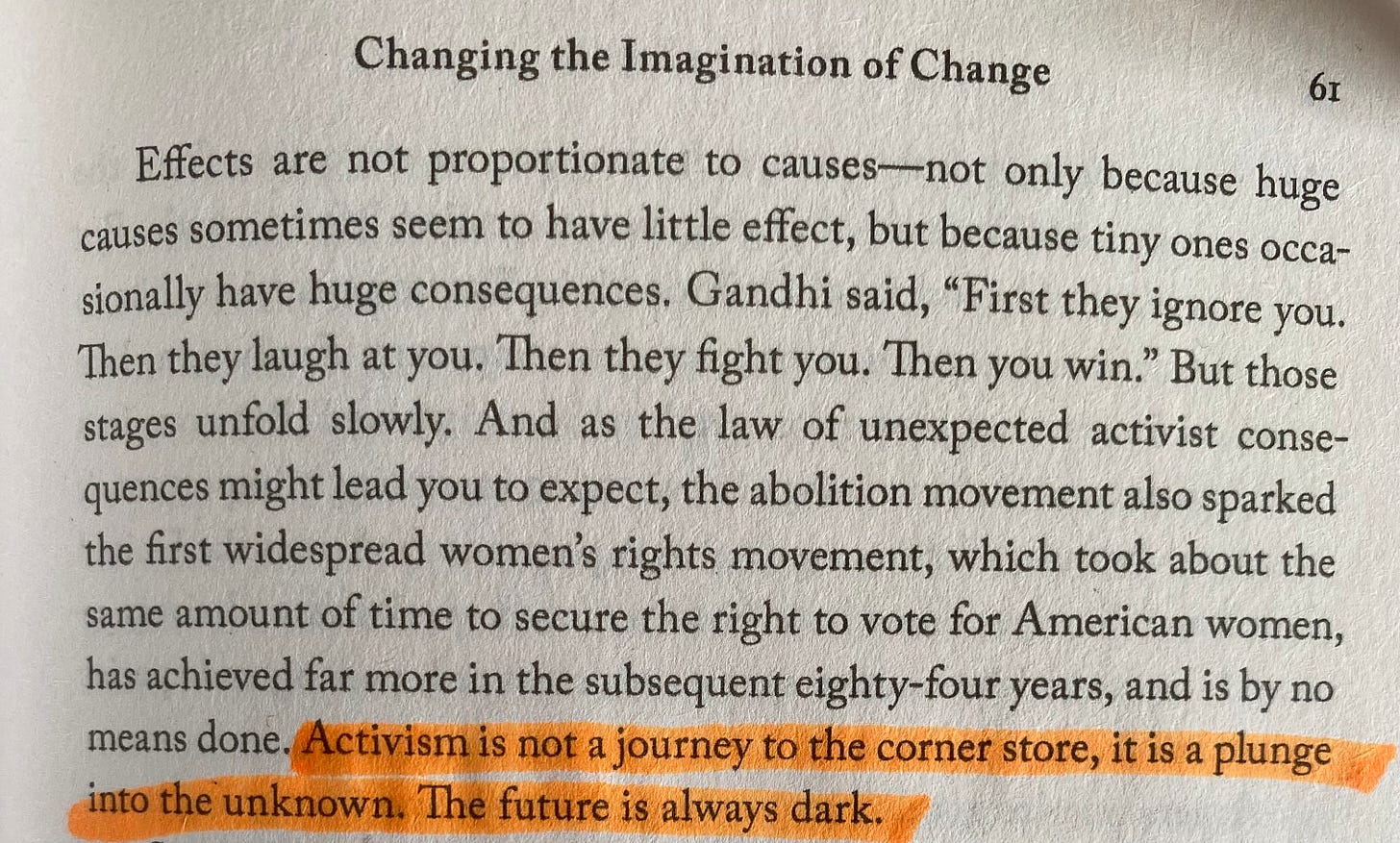I’m not sure about anyone else, but in my personal opinion lately there’s been a distinct lack of sun, a distinct increase in rain, and I’m struggling to recall the last time I was fully, down-to-the-bone warm.
I find winter abysmal for many reasons, but mostly the fact that you can’t see the sky.
There’s something about that blue that feels hopeful, and in a world with the kind of 24-hour-but-actually-endless news cycles that we have, hope sometimes feels in short supply.
I said in my last post that I’m reading Rebecca Solnit’s Hope in the Dark, and something that struck me recently was this (this is the first time I’ve ever felt the need to highlight a book):
“Activism is not a journey to the corner store. It is a plunge into the unknown. The future is always dark.”
- Rebecca Solnit
If the future is always dark, how is it that we find glimpses of blue sky?
Solnit also says this:
“Stories migrate secretly. The assumption that whatever we now believe is just common sense, or what we always knew, is a way to save face. It's also a way to forget the power of a story and of a storyteller, the power in the margins, and the potential for change.”
- Rebecca Solnit
Our potential for change rests on our willingness to listen and to do something about it - to help our most vulnerable and urgent stories migrate, to help them become something we’ve always known to be true.
Because I have been cold for weeks now and because I live in a house that leeches warm air through the windows, and I wake up with condensation on the glass every day no matter how often I run the dehumidifier, and because I have lived in other houses where three layers of clothes will just about get you through winter, and houses where the cough you develop might be aided and abetted by the damp creeping through the floors and the walls while a landlord insists there’s nothing to be done, I want to share with you a little pocket of blue sky I encountered this week.
The NZ Greens are highlighting rental horror stories, like this one. They are hoping to impress upon our current government, much like they hoped to impress upon our last one that the housing standards by which we live are inadequate - especially for the 1 in 3 NZ households who rent.
The flow on effect of poor housing standards has an obvious negative impact to health, food and wealth inequity.
According to Stats NZ when “housing costs approach 40 percent or more of a household's income, it becomes more likely that a household will start being unable to meet other everyday expenses, particularly for low-income households.
In Aotearoa New Zealand, 23.7 percent of all households had a minor or major issue with dampness or mould in the year ended June 2022. For households that made rent payments, however, 35.5 percent had an issue with dampness or mould.
Similarly, 31.2 percent of households that rent had a minor or major issue with keeping adequately warm in winter, compared with 20.3 percent of all households in Aotearoa New Zealand.”
Consumer NZ reports the financial records of the ‘big four’ power companies - Meridian, Contact, Genesis and Mercury – had combined earnings of $2.7 billion over the last year – about $7.4 million a day.
The article goes on to say that people “are surviving winter in cold, dark homes without access to a warm shower or a home cooked meal – some for months.”
Stats NZ says in “the year ended June 2022, 32.2 percent of households in Aotearoa New Zealand said their income was ‘not enough’ or ‘only just enough’.
For households that made rent payments, 49.6 percent perceived their income as ‘not enough’ or ‘only just enough.”
The NZ Herald reports that “findings from the New Zealand Food Network (NZFN) has revealed a 42 per cent increase in demand for food support this year. The need is up a whopping 83 per cent when compared to 2021.”
The facts are crystal clear - which means we are deliberately watching this happen to our neighbours, colleagues, friends, whānau - and deliberately refusing to implement policy to sort it out.
This excellent post from A.R. Moxon also talks about hope - and about despair specific to the US but very relevant to Aotearoa:
“There's a pervasive and inescapable feeling of dread and despair around, because there is supposed to be; dread and despair being spiritual states that fascists, those American supremacist bullies… most want us to occupy.”
- A.R. Moxon
Much like wishing for summer in the middle of winter, I keep expecting political parties to behave in ways they don’t have the intent or capacity to.
Whether it’s intent or capacity, as with any relationship - believe the behaviour.
The blue sky moments for me at the moment are finding those who believe in the power of people’s stories, who are actively working to change the ending - and who refuse to believe that just because it’s cold right now, that the weather can’t change.
“Find people for whom it is hard and make it easier. Find people for whom it is easy and make it harder. I don't think there's a more defiant act than that, or a more hopeful one.”
- A.R. Moxon





In pluvial NZ Electricity is generated by water falling free from the heavens. Last century our forebears built dams and power stations that still work effectively and efficiently and owe today's tax payer nothing. How is that huge profits are being generated for shareholders and not mum and dad shareholders? What happened? Today Comalco is being paid by our government to take 10% of our total electricity supply and measurably contribute to global warming. Solar power panels are not suitable for our pluvial nation and windmills are unnecessary too